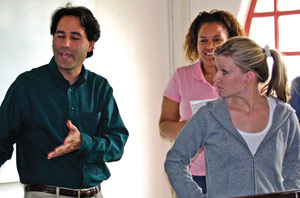Scott Frisch is both a role model and teacher who encourages students to become involved with issues, to learn how to communicate, collaborate, and affect positive change.
 They will be there--interested, involved, and engaged. They will advocate their positions, advance change for the better, and solve problems. Wherever there are issues that matter, CSUCI students will make a difference.
They will be there--interested, involved, and engaged. They will advocate their positions, advance change for the better, and solve problems. Wherever there are issues that matter, CSUCI students will make a difference.
That's the goal of Scott Frisch, associate professor of political science, who is helping to create a CSUCI education that provides students with an ability to think critically, to analyze, to communicate--and to use these skills in any arena of discussion.
"That's what we're trying to do here," Frisch says. "Once our students graduate, we want them to be active in their communities, to become engaged and collaborate with others, and compromise when necessary, to achieve solutions to real-life issues and problems."
Frisch has a talent for engaging students in the classroom. At the beginning of classes, he brings up topical issues that become springboards to activate minds and opinions. He creates classroom conversations that are insightful, enjoyable, and dynamic.
"Professor Frisch is a gift to the University," says Alyssa Lanz, a junior political science major. "His enthusiasm and insight into the field of political science is inspiring. He has a unique way of presenting material to keep it interesting and fun. We laugh, argue, and learn. He relates all subject material to current events, taking the subject material beyond what is presented in books. Professor Frisch has left a lasting impression on my life."
Christopher Hoffmann, a junior who switched his major to political science after taking a class with Frisch, is equally impressed. "He is one of the best teachers I've ever had. He's amazing. He brings such experience to the table, having worked on Capitol Hill. He doesn't lecture to us. It's more like good conversation."Students also benefit from Frisch's emphasis on the Univer-sity's interdisciplinary approach. "We want to give students a different perspective on another subject and to learn to do a different kind of writing," he says. "We want them to establish an argument and be able to defend it, and then create some sort of policy statement."
This past semester, Frisch and Amy Denton, assistant professor of biology, taught an interdisciplinary course in science and public policy. "We focused on contemporary issues and controversies in the use of science to make public policy," Frisch said. "Topics included stem cell research, genetically modified crops, the Endangered Species Act, global warming, and funding of scientific research. We looked at each of the issues from both scientific and policy perspectives."
Frisch has also been involved with two University programs that are distinctly part of the CSUCI mission, the American Democracy Project, which helps students to gain an understanding of the political process, and the Center for Civic Engagement and Service Learning, which provides academic courses as well as community service experiences for students.
"Both of these activities not only engage our students in important issues, but also help to form partnerships with the community," Frisch says. "These programs have the potential to create dynamic interaction between students and community leaders.
"When our students graduate, I want them to become good citizens who care about their communities." Frisch says. "I want them to be informed. I want them to know that they can agree or disagree�in a civil way�and that their voices will be heard. I want them to know that what they think about and what they act upon, matters.
"They can make a difference. And I'm confident they will."
Profile:
Education:
A.B., international affairs, Lafayette College; M.A., political science/international relations, M.G.A., government administration, University of Pennsylvania; Ph.D., political science, Claremont Graduate University
Areas of Specialization:
American Institutions (Congress, the Presidency); public policy; and public budgeting
Professional Experience:
President Management Internship (now Fellowship), a 2-year federal employee training program; worked in U.S. Treasury Department; aide to U.S. Senator Frank Lautenberg
At CSUCI:
Established political science minor, 2004; developed political science major, to be launched in fall 2006; participated in national American Democracy Project; helped to establish Civic Engagement and Service Learning Program; co-chaired the Academic Master Planning Taskforce
Book:
Author of The Politics of Pork: A Study of Congressional Appropriations Earmarks, and co-author, with Sean Kelly, of Committee Assignment Politics in the U.S. House of Representatives.
